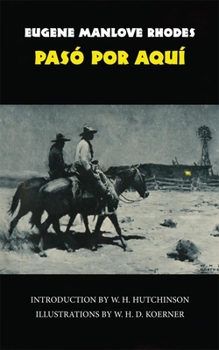Pasó Por Aquí, Volume 50
Select Format
Select Condition 
Book Overview
Taking his title, Pas Por Aqu , from Juan de O ate's carving in the living rock of El Morro, New Mexico, Eugene Manlove Rhodes created his own memorial to the decent people of his world who had "passed this way" without fanfare. Rhodes wrote about them with wit, gusto, and tenderness, with honesty, clarity, and a sureness of interpretation as yet unequaled. He captured for all time the free, lonely, self-reliant, skilled, eternally optimistic essence...
Format:Paperback
Language:English
ISBN:0806113812
ISBN13:9780806113814
Release Date:August 1973
Publisher:University of Oklahoma Press
Length:148 Pages
Weight:0.40 lbs.
Dimensions:0.3" x 5.0" x 8.0"
Customer Reviews
2 ratings
His best known work
Published by Thriftbooks.com User , 21 years ago
This is the best known work of Rhodes, a New Mexico schoolteacher-rancher turned author. It is a charming story, but is probably best understood as a good quality dime-novel of the period; kids over 10 will probably get as much out of it as adults. If you like the work, I recommend the biography Rhodes' wife, May Davidson Rhodes, wrote about him; it was one of my favorite books growing up.
"Passed By Here"
Published by Thriftbooks.com User , 25 years ago
This short novel first appeared in the February 2-27 issues of the Saturday Evening Post in 1926. Rhodes was a writer living and writing out of New Mexico who was a very colorful person, often getting in trouble with the law (including with Sheriff Pat Garrett). This particular novel is regarded by many as one of the best westerns ever. In 1977 it was voted by the Western Writers of America one of the top twenty-five westerns of all time. Rhodes' novels are highly regarded in that they are felt to accurately depict life in the West. Apparently, Rhodes was an opponent of Sheriff Pat Garrett in his younger days yet grew incensed in his later years at how Garrett was mistreated in books and film. In this novel, he presents Garrett as a man he knew, as a thoughtful and generous professional. The novel starts out with a humorous bank robbery in Bolan, New Mexico, by red-headed Ross McEwen. McEwen rides south, evading all of the posses sent after him. Finally, in order to throw them off his trail near the White Sands desert, he releases his horse and starts riding a steer. He comes across a cabin containing a Mexican family (a mother, two sons, and a grandfather), all of whom have contracted diphtheria. Without hesitating, he starts to help them. One of the things remarkable about this book is how an author, born in 1869, and living among "gringos" in New Mexico is able to write a novel in the 1920s treating Caucasians and Hispanics so equally. There is no bigotry here. Perhaps, bigotry between "gringos" and Mexicans was not as prevalent in the Southwest as the more recent films and novels would have us believe. At least, not among Westerners. Notice that the "hero" of the book doesn't even hesitate to think about helping the family. He does it even though it may lead to his capture. Perhaps this is another typically Western response. The book was made into a poorly-received film released in the late 1940s entitled "Four Faces West" starring Joel McCrea and Charles Bickford.






